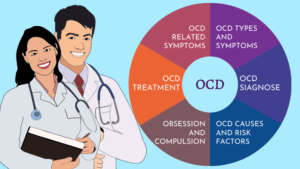If you are one of the millions of people who suffer from OCD, then you know how important it is to find the right psychiatrist. There are many different types of OCD, so it is important to find a doctor who understands your specific type of disorder. In this blog post, we will discuss how to find the right OCD psychiatrist for you. We will also provide tips on how to prepare for your first appointment.
Contents
What Is OCD?
OCD is a type of anxiety disorder that causes people to have obsessive thoughts and compulsions. People with OCD often have difficulty completing everyday tasks because they are consumed by their obsessions. For example, someone with OCD might obsessively wash their hands or check the locks on their doors multiple times throughout the day.
There are many different types of OCD, so it is important to find a psychiatrist who specializes in treating your specific type of disorder. If you are not sure what type of OCD you have, your primary care doctor can refer you to a specialist.
Who Is A Psychiatrist?
A psychiatrist is a medical doctor who specializes in mental health. Psychiatrists can prescribe medication and provide therapy. They are also able to order laboratory tests and brain imaging studies, if necessary.
What Should I Look For In A Psychiatrist?

When you are looking for a psychiatrist, it is important to find someone who you feel comfortable with and who has experience treating OCD. You may want to ask your friends or family members if they know of any good psychiatrists in your area. You can also search online for reviews of local psychiatrists. Once you have found a few potential doctors, you can call their offices to schedule an appointment.
You can also look out for similar demographic backgrounds like gender, ethnicity, religion, age or language. This can make you feel comfortable and safe while talking and seeking treatment. You can also inquire about their educational background, work experience, pre-existing skill set and approach to therapy to see if they match your expectations.
Treatment Used For OCD
There are many different types of treatment available for OCD. Some people benefit from medication, while others may need to participate in therapy or a combination of both. It is important to find a psychiatrist who is familiar with the latest research and treatment options for OCD.
If you are considering medication for your OCD, you may want to ask about the following:
- What types of medications are available?
- How do the medications work?
- What are the side effects of the medications?
- How long will I need to take the medication?
- Will I need to take the medication for the rest of my life?
In addition to medication, psychologists also make use of therapeutic techniques. The most common type of therapy used to treat OCD is Exposure and Response Prevention (ERP). This type of therapy helps people confront their fears and learn to control their compulsions.
If you are considering therapy for your OCD, you may want to ask about the following:
- What types of therapies are available?
- How does exposure and response prevention work?
- What are the side effects of the therapies?
- How long will I need to participate in therapy?
- Will I need to participate in therapy for the rest of my life?
Preparing For Your First Appointment

Once you have scheduled an appointment with a psychiatrist, there are a few things you can do to prepare.
- First, it is important to write down all of your symptoms. This will help the doctor to diagnose your disorder and develop a treatment plan.
- You should also make a list of any medications you are currently taking or if you have any other existing mental/physical illnesses. Be sure to bring this list with you to your appointment.
- Accept and make peace with the fact that you might have to face some side effects. It is a common occurrence in psychiatric drugs. Make sure to talk through it with your medical provider for ways to manage these effects.
- Finally, it is helpful to write down any questions you have for the doctor. This will ensure that you get all of the information you need from your appointment.
Things To Keep In Mind
When meeting with a new psychiatrist, it is important to come prepared with questions about your treatment options. Here are some examples of questions you may want to ask:
- What type of therapy do you specialize in?
- Do you believe in medication for OCD?
- Will I have any therapy homework?
- What are your success rates with treating patients with OCD?
- How many sessions will I need to see results?
These are just a few examples of questions you may want to ask your psychiatrist. It is important to find a doctor who you feel comfortable talking to and who will be able to provide the best treatment for your specific type of OCD.
Red Flags To Avoid
When meeting with a potential psychiatrist, there are a few red flags to be aware of.
- First, you should avoid any doctor who seems judgmental or dismissive of your disorder. It is important to find a psychiatrist who is open-minded and willing to listen to your concerns.
- You should also avoid any doctor who seems too quick to prescribe medication. While medication can be an effective treatment for OCD, it should not be the only treatment option considered.
- Finally, you should be wary of any doctor who refuses to answer your questions or does not seem knowledgeable about the latest research on OCD treatments.
Conclusion
If you or someone you know suffers from OCD, it is important to find the right psychiatrist. There are many different types of OCD, so it is important to find a doctor who specializes in treating your specific type of disorder. In this blog post, we have provided tips on how to find the right OCD psychiatrist for you. We have also provided questions that you may want to ask during your first appointment.
If you are looking for affordable Online OCD Counseling MantraCare can help: Book a trial OCD therapy session


